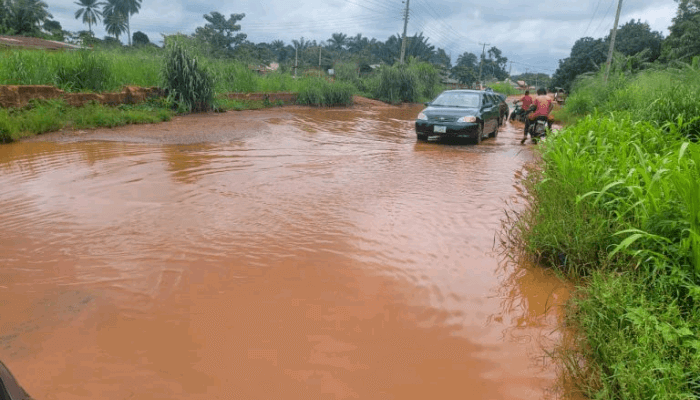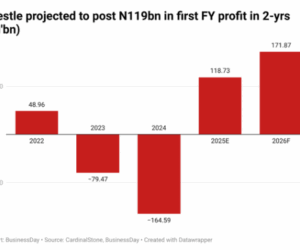Absence of critical infrastructure such as motorable roads and inefficiencies in transport and storage are undermining Africa’s ability to feed its population effectively and trade effectively.
A new report by the World Bank titled, ‘Transport Connectivity for Food Security in Africa: Strengthening Supply Chains’ highlights how widening infrastructural gaps in Nigeria are stifling trade operations with other neighbouring African countries.
These inefficiencies have far-reaching consequences — they inflate food prices, exacerbate waste, and heighten vulnerability to disruptions caused by climate change, conflict, and global supply chain shocks.
The World Bank notes that more than 30 percent of food in Africa is lost in transit due to excessive heat and long distances, adding to Nigeria’s N3.5 trillion annual post-harvest loss.
With a rapidly growing population, intensifying climate pressures, and a dangerous overreliance on imported food from abroad, Africa’s most populous nation’s food system requires urgent intervention, the World Bank says.
“Africa generally imports food from overseas markets rather than from within the continent. Intracontinental trade makes up only 5 percent of Africa’s trade in cereals, and accessing food takes up to 10 times longer than in developed regions,” the report says.
At the Nigeria-Egypt business forum in July, Yusuf Tuggar, minister of Foreign Affairs, stated that Nigeria accrued $12.2 million from trading with Egypt in 2023, citing the imbalance and scale of untapped opportunities between the two nations.
In no particular order, BusinessDay examines some of the issues limiting intra-trade operations in Nigeria, as outlined by the World Bank, and explores how they can be addressed.
Regional trade barriers
At the regional scale, there is limited trade in staple food commodities between African countries.
Non-tariff barriers (NTBs), such as bureaucratic delays and hidden costs, increase regional trade costs by 8–25 percent, further disconnecting markets.
As a result, food surpluses in one African country or region often fail to reach neighbouring areas.
Long supply chains
Because of insufficient production and inefficient distribution, Africa has a high import dependence, with as much as 25 percent of its food being imported even when neighbouring countries have surpluses.
Food travels an average of 4,000 kilometres, taking up to 10 times longer to transport compared with developed regions of the world.
This delay is tied to inefficient ports, with only 52 of 138 having equipment for handling significant food volumes, leading to delays, congestion, and higher costs.
Read also: Global food prices hit two year peak
Limited storage
Nigeria’s food supply chain operates on an almost “just-in-time” basis, with limited food storage in case of emergencies or supply shocks from global markets.
Limited storage capacity, with less than 30 percent of annual production being stored, results in significant post-harvest losses.
A significant amount of locally produced food, 37 percent, is wasted as a result of insufficient storage and cold chain infrastructure.
High costs of transport services
In Africa’s most populous nation, market distortions in transport services result in monopolistic practices, allowing a few operators to inflate prices.
This issue limits affordable transport options for farmers and consumers, exacerbating food security risks.
Similarly, fragile infrastructure, characterised by especially patchy or poorly maintained domestic transport systems, makes the networks vulnerable to damage from extreme climate events.
Hence, farmers in remote areas face significant challenges in transporting goods to markets, especially during the rainy season.
Poor rural road access
Lack of accessible roads isolates farmers from markets. Approximately 60 percent of Africa’s rural population lives more than 2 kilometres from an all-season road.
According to the report, poor rural transport networks slow food distribution and increase costs.
The way forward
Nigeria must address NTBs. Tackling NTBs and addressing inefficiencies in intra-African trade will reduce reliance on overseas imports.
Also, aligning and implementing trade policies, with an emphasis on NTBs within and across regional economic communities, will help lower costs and promote cross-border trade between African states.
The World Bank calls for modernisation and upgrading of critical seaports to improve efficiency and reduce delays through streamlining customs and border controls to reduce both costs and time to enhance the flow of goods.
“Investing in key regional corridors is critical to efficiently connect surplus and deficit areas,” it said.
It noted that maintaining existing roads will drive expanding access to all-season roads that will connect rural farmers to markets and stabilise food distribution.
“Develop transportation infrastructure that can endure disruptions caused by severe weather and other hazards,” the World Bank report added.









